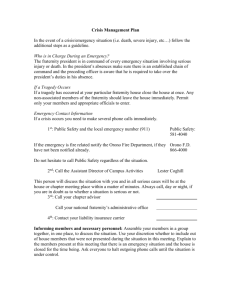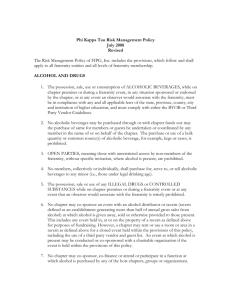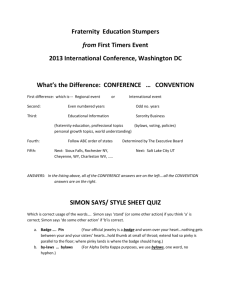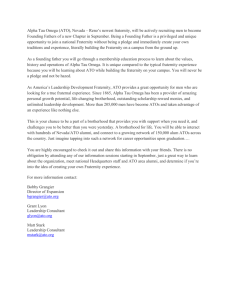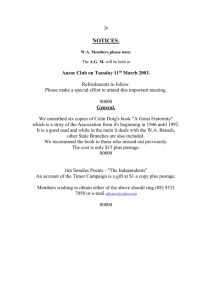Governance Policies
advertisement
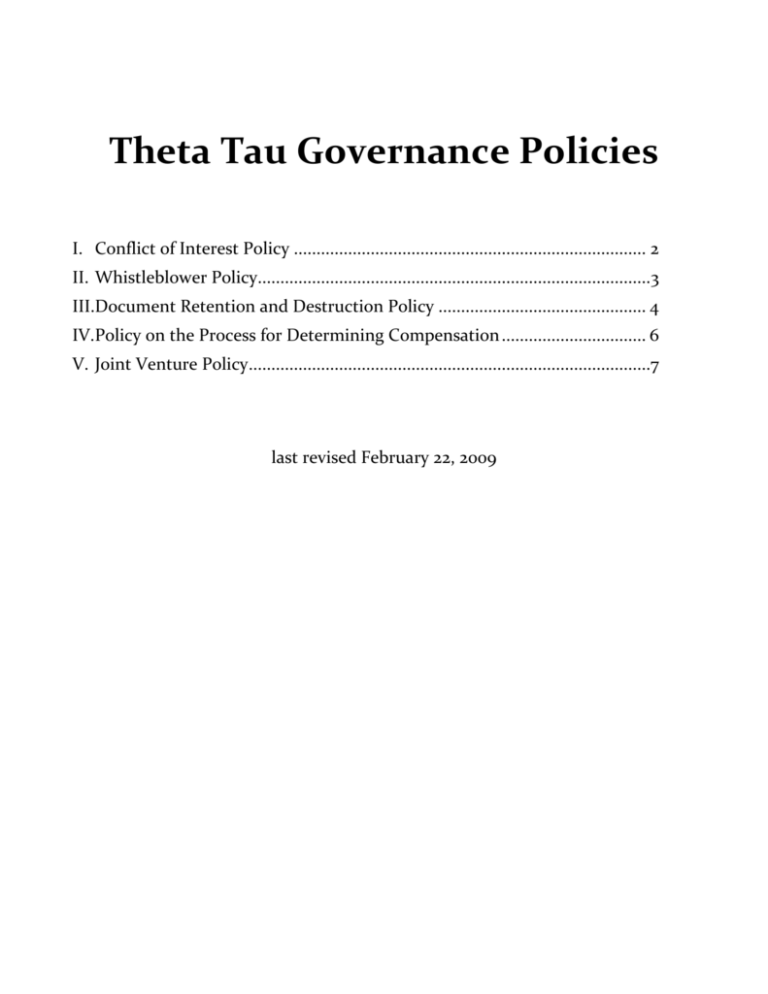
Theta Tau Governance Policies I. Conflict of Interest Policy .............................................................................. 2 II. Whistleblower Policy.......................................................................................3 III.Document Retention and Destruction Policy .............................................. 4 IV.Policy on the Process for Determining Compensation ................................ 6 V. Joint Venture Policy.........................................................................................7 last revised February 22, 2009 I. Conflict of Interest Policy This Conflict of Interest Policy of Theta Tau (the “Fraternity”) : (1) defines conflicts of interest; (2) identifies classes of individuals within the Fraternity covered by this policy; (3) facilitates disclosure of information that may help identify conflicts of interest; and (4) specifies procedures to be followed in managing conflicts of interest. 1. Definition of conflicts of interest. A conflict of interest arises when a person in a position of authority within the Fraternity may benefit financially from a decision made in that capacity, including indirect benefits such as to family members or businesses with which the person is closely associated. This policy is focused upon material financial interest of, or benefit to, such persons. 2. Individuals covered. Persons covered by this policy are the Fraternity’s Executive Council members, officers, directors, and all Theta Tau employees. This policy is not intended and does not apply to the setting of fees, dues, or other prices for its chapters, colonies, and members in accord with its laws. 3. Facilitation of disclosure. Persons covered by this policy will annually disclose or update to the Executive Council on a form provided by the Fraternity their interests that could give rise to conflicts of interest, such as a list of family members, substantial business or investment holdings, and other transactions or affiliations with businesses and other Fraternities or those of family members. 4. Procedures to manage conflicts. For each interest disclosed to the Executive Council, the Executive Council will determine by simple majority vote whether to: (a) take no action; (b) assure full disclosure to others in Theta Tau covered by this policy; (c) ask the person to recuse from participation in related discussions or decisions within the Fraternity; or (d) ask the person to resign from his or her position in the Fraternity or, if the person refuses to resign, become subject to possible removal in accordance with the Fraternity’s removal procedures. The Fraternity’s Executive Director will monitor proposed or ongoing transactions for conflicts of interest and disclose them to the Executive Council in order to deal with potential or actual conflicts, whether discovered before or after the transaction has occurred. 2 II. Whistleblower Policy This Whistleblower Policy of Theta Tau (the “Fraternity”) : (1) encourages staff and volunteers to come forward with credible information on illegal practices or serious violations of adopted policies of the Fraternity; (2) specifies that the Fraternity will protect the person from retaliation; and (3) identifies where such information can be reported. 1. Encouragement of reporting. The Fraternity encourages complaints, reports or inquiries about illegal practices or serious violations of the Fraternity’s policies, including illegal or improper conduct by the Fraternity itself, by its leadership, its volunteers, or by others on its behalf. Appropriate subjects to raise under this policy would include financial improprieties, accounting or audit matters, ethical violations, or other similar illegal or improper practices or policies. Other subjects on which the Fraternity has existing complaint mechanisms should be addressed under those mechanisms, such as raising matters of alleged discrimination or harassment via the Fraternity’s human resources channels, unless those channels are themselves implicated in the wrongdoing. This policy is not intended to provide a means of appeal from outcomes in those other mechanisms. 2. Protection from retaliation. The Fraternity prohibits retaliation by or on behalf of the Fraternity against officers, staff, or volunteers for making good faith complaints, reports or inquiries under this policy or for participating in a review or investigation under this policy. This protection extends to those whose allegations are made in good faith but prove to be mistaken. The Fraternity reserves the right to discipline persons who make bad faith, knowingly false, or vexatious complaints, reports or inquiries or who otherwise abuse this policy. While efforts to keep the source of the complaint confidential will be made upon request, the Fraternity cannot guarantee, promise, nor ensure such confidentiality or anonymity. The concept of a “whistleblower” is fundamentally in conflict with confidentiality and anonymity. 3. Where to report. Complaints, reports or inquiries may be made under this policy on a public, confidential, or anonymous basis. They should describe in detail the specific facts demonstrating the bases for the complaints, reports or inquiries. They should be directed to the Executive Director or Grand Regent; if both of those persons are implicated in the complaint, report or inquiry, it should be directed to the Grand Marshal. The Fraternity will conduct a prompt, discreet, and objective review or investigation. The Fraternity may be unable to fully evaluate a vague or general complaint, report, or inquiry that is made anonymously or one that is not made in a timely manner 3 III. Document Retention and Destruction Policy This Document Retention and Destruction Policy of Theta Tau (the “Fraternity”) identifies the record retention responsibilities of staff, volunteers, members of the Board of Directors, and outsiders for maintaining and documenting the storage and destruction of the Fraternity’s documents and records. 1. Rules. The Fraternity’s staff, volunteers, members of the Executive Council and outsiders (i.e., independent contractors via agreements with them) are required to honor these rules: (a) paper or electronic documents indicated under the terms for retention below will be transferred and maintained by the Human Resources, Legal or Administrative staffs/departments or their equivalents; (b) all other paper documents will be destroyed after three years; (c) all other electronic documents will be deleted from all individual computers, data bases, networks, and back-up storage after one year; and (d) no paper or electronic documents will be destroyed or deleted if pertinent to any ongoing or anticipated government investigation or proceeding or private litigation. 2. Terms for retention. a. Retain permanently: Governance records – Charter and amendments, Bylaws, other Fraternity documents, governing board and board committee minutes. Tax records – Filed state and federal tax returns/reports and supporting records, tax exemption determination letter and related correspondence, files related to tax audits. Intellectual property records – Copyright and trademark registrations and samples of protected works. Financial records – Audited financial statements, attorney contingent liability letters. b. Retain for ten years: Pension and benefit records -- Pension (ERISA) plan participant/beneficiary records, actuarial reports, related correspondence with government agencies, and supporting records. Government relations records – State and federal lobbying and political contribution reports and supporting records. c. Retain for three years: Employee/employment records – Employee names, addresses, social security numbers, dates of birth, INS Form I-9, resume/application materials, job descriptions, dates of hire and termination/separation, evaluations, compensation information, promotions, transfers, disciplinary matters, time/payroll records, leave/comp time/FMLA, engagement and discharge correspondence, documentation of basis for independent contractor status (retain for all current employees and independent contractors and for three years after departure of each individual). Lease, insurance, and contract/license records – Software license agreements, vendor, hotel, and service agreements, independent contractor agreements, employment agreements, consultant agreements, and all other agreements (retain during the term of the agreement and for three years after the termination, expiration, non-renewal of each agreement). 4 d. Retain for one year: All other electronic records, documents and files – Correspondence files, past budgets, bank statements, publications, employee manuals/policies and procedures, survey information. 3. Exceptions. Exceptions to these rules and terms for retention may be granted only by the Fraternity’s Grand Regent. 5 IV. Policy on the Process for Determining Compensation This Policy on the Process for Determining Compensation of Theta Tau (the “Fraternity”) applies to the compensation of the Executive Director of the Fraternity. 1. Review and approval. The compensation of the Executive Director is reviewed and approved by the Executive Council or compensation committee of the Executive Council, provided that persons with conflicts of interest with respect to the compensation arrangement at issue are not involved in this review and approval. 2. Use of data as to comparable compensation. The compensation of the person is reviewed and approved using data as to comparable compensation for similarly qualified persons in functionally comparable positions at similarly situated organizations. 3. Contemporaneous documentation and recordkeeping. There is contemporaneous documentation and recordkeeping with respect to the deliberations and decision regarding compensation and employment. 6 V. Joint Venture Policy This Joint Venture Policy of Theta Tau (the “Fraternity”) requires that the Fraternity evaluate its participation in joint venture arrangements under Federal tax law and take steps to safeguard the Fraternity’s exempt status with respect to such arrangements. It applies to any joint ownership or contractual arrangement through which there is an agreement to jointly undertake a specific business enterprise, investment, or exempt-purpose activity as further defined in this policy. A. Joint ventures or similar arrangements with taxable entities. For purposes of this policy, a joint venture or similar arrangement (or a “venture or arrangement”) means any joint ownership or contractual arrangement through which there is an agreement to jointly undertake a specific business enterprise, investment, or exempt-purpose activity without regard to: (1) whether the Fraternity controls the venture or arrangement; (2) the legal structure of the venture or arrangement; or (3) whether the venture or arrangement is taxed as a partnership or as an association or corporation for federal income tax purposes. A venture or arrangement is disregarded if it meets both of the following conditions: (a) 95% or more of the venture’s or arrangement’s income for its tax year ending within the Fraternity’s tax year is excluded from unrelated business income taxation [including but not limited to: (i) dividends, interest, and annuities; (ii) royalties; (iii) rent from real property and incidental related personal property except to the extent of debt-financing; and (iv) gains or losses from the sale of property]; and (b) the primary purpose of the Fraternity’s contribution to, or investment or participation in, the venture or arrangement is the production of income or appreciation of property. 2. Safeguards to ensure exempt status protection. The Fraternity will: (a) negotiate in its transactions and arrangements with other members of the venture or arrangement such terms and safeguards adequate to ensure that the Fraternity’s exempt status is protected; and (b) take steps to safeguard the Fraternity’s exempt status with respect to the venture or arrangement. Some examples of safeguards include: (i) control over the venture or arrangement sufficient to ensure that it furthers the exempt purpose of the Fraternity; (ii) requirements that the venture or arrangement gives priority to exempt purposes over maximizing profits for the other participants; (iii) that the venture or arrangement not engage in activities that would jeopardize the Fraternity’s exemption; and (iv) that all contracts entered into with the Fraternity be on terms that are arm’s length or more favorable to the Fraternity. 7
